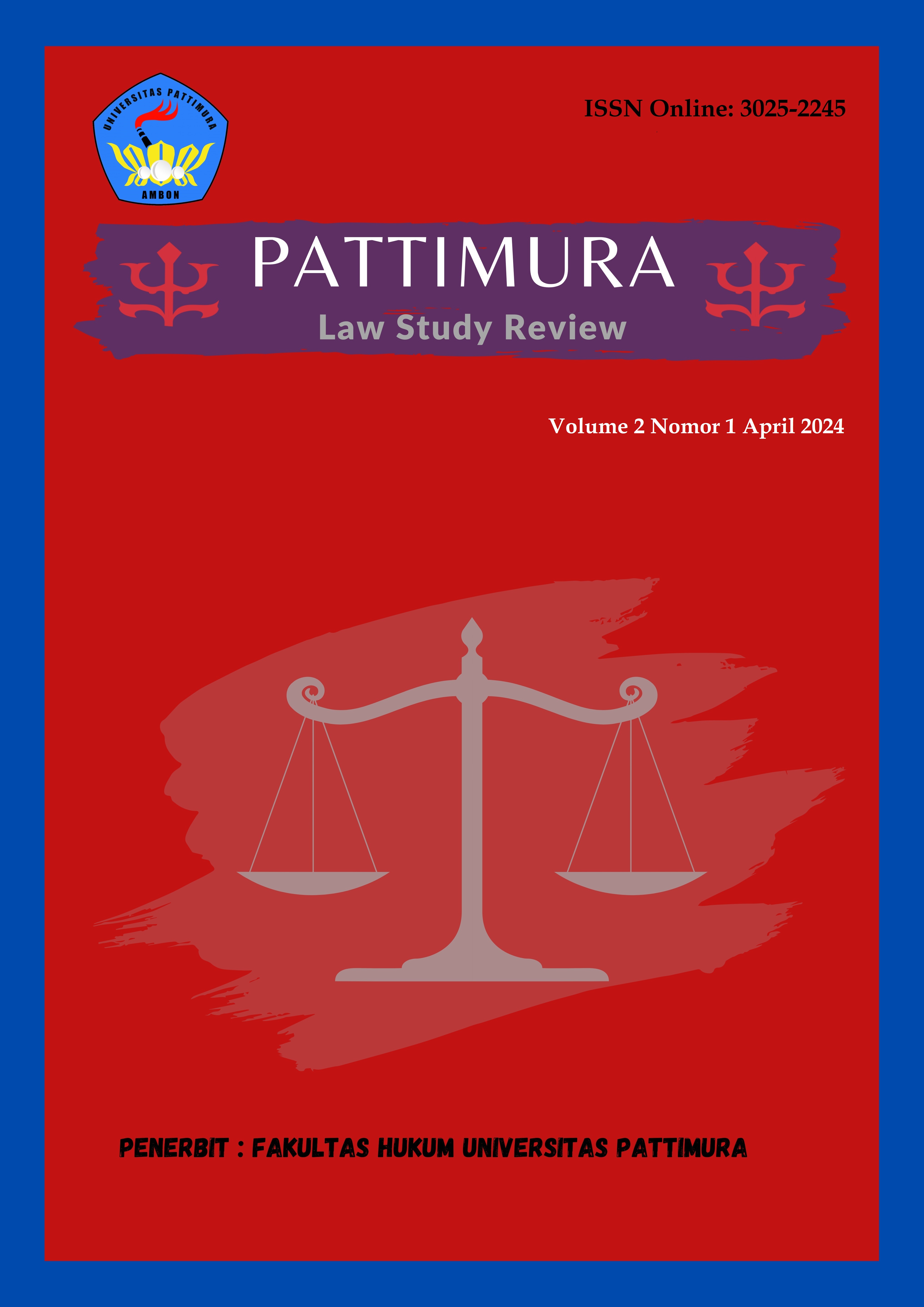Kajian Viktimologi Orang Dengan Gangguan Jiwa Sebagai Korban Penganiayaan
Abstract
ABSTRACT: Persecution is an act against the law, so there are many actions that can be carried out by irresponsible people, where an act of covering up what happened can be in the form of torturing, thinking, etc. An act of drawing can occur intentionally or unintentionally so it can also result in the death of a human victim. For example, the transmission case that occurred in Masohi was a victim of a person with a mental disorder, where the suspect named Ancamali carried out the transmission to a person with a mental disorder and also burned the person with a mental disorder, resulting in the victim dying, so Ancamali received a prison sentence of 4 years and 6 months. The problem that the author can discuss is how to study the victimology of people with mental disorders (ODGJ) who are victims of abuse and how to deal with people with mental disorders who become human victims. This writing uses the Normative Juridical research type, with a statutory regulation approach, a conceptual approach and a case approach. The results of the research show that actions carried out by irresponsible people are mandatory and must be held accountable in accordance with applicable regulations, in article 338 of the criminal code which states "whoever deliberately takes the life of another person is threatened because murder with a maximum prison sentence of fifteen years.” as well as efforts to handle people with mental disorders who become human victims, can be done through preventive and repressive efforts.
Downloads
References
Deassy J. A. Heanussa, Denny Latumaerissa, iqbal Taufik, (2017) Penanganan Tindak Pidana Perdagangan Orang Di Provinsi Maluku. jurnal Muara Ilmu Sosial, Humaniora dan seni 2(1), 284-289, https://journal.untar.ac.id/index.php/jmishumsen/article/view/1680
Muhammad Raflenchyo, Pertanggungjawaban Pidana Pelaku Tindak Pidana Penganiayaan yang Mengakibatkan Kematian, Vol 2, Jurnal Ilmiah Multidisiplin, 2023.
Patrick Corputty, Deassy Hehanussa, Julianus Latupeirissa., (2021). Victim Precipitation Sebagai Pertimbangan Dalam Penjatuhan Pidana (Kajian Perspektif Sistem Peradilan Pidana), Jurnal Belo. 7(1), 113-121, DOI: https://doi.org/10.30598/belovol7issue1page113-121
Buku
Dikdik M. Arief Mansur dan Elisatris Gultom, Urgensi Perlindungan Korban Kejahatan,
RajaGrafindo Persada, Jakarta, 2006.
Chairul Huda, Dari Tiada Pidana Tanpa Kesalahan Menuju Kepada Tiada Pertanggungjawaban Pidana Tanpa Kesalahan, Prenada Media Group, Jakarta, 2008.
Hanafi, Mahrus, Sisitem Pertanggung Jawaban Pidana, Cetakan pertama, rajawali pers, jakarta, 2015.
Leden Marpaung, Tindak Pidana Terhadap nyawa dan Tubuh, sinar Grafika, Jakarta, 2000.
Majda El Muhtaj, Hak Asasi Manusia dalam Konstitusi Indonesia, Kencana, Jakarta, 2007.
Muhammad Raflenchyo, Pertanggungjawaban Pidana Pelaku Tindak Pidana Penganiayaan yang Mengakibatkan Kematian, Vol 2, Jurnal Ilmiah Multidisiplin , 2023.
Ratih Permata Sari, Perlindungan Hukum Terhadap Orang Dengan Gangguan Jiwa Perspektif Hukum Islam, Bandar Lampung, 2022.
Rena Yulia, Viktimologi Perlindungan Hukum Terhadap Korban Kejahatan, Graha Ilmu, Yogyakarta, 2010.
Satjipto Raharjo, Penegakan Hukum Suatu Tinjauan Sosiologi, Genta Publishing, Jakarta, 2009.
Online/ Online/World Wide Web, Dan Lain-Lain
http://digilib.uinkhas.ac.id/15643/1/D20183063%20MUHAMAD%20FIKRI%20H%20REVISI%20SKRIPSI.pdf diakses Tanggal 21 Januari 2024
Copyright (c) 2024 Mikhael Patric Jansen Mailoa, Julianus Edwin Latupeirissa, Iqbal Taufik (Author)

This work is licensed under a Creative Commons Attribution-NonCommercial 4.0 International License.
Authors who publish their manuscripts in this Journal agree to the following conditions:
- The copyright in each article belongs to the author, as well as the right to patent.
- Authors are able to enter into separate, additional contractual arrangements for the non-exclusive distribution of the journal's published version of the work (e.g., post it to an institutional repository or publish it in a book), with an acknowledgment of its initial publication in this journal.
- Authors are permitted and encouraged to post their work online (e.g., in institutional repositories or on their website) prior to and during the submission process, as it can lead to productive exchanges, as well as earlier and greater citation of published work.
- Authors have the right to self-archiving of the article (Author Self-Archiving Policy)













